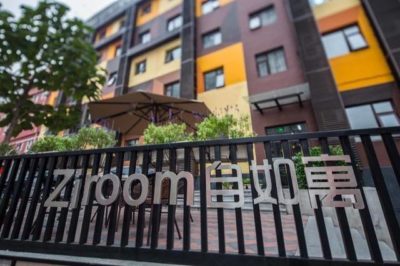
Ziroom CEO Xiong Lin likes to keep himself healthy
A social media post linking the leukemia death of an Alibaba employee living in an allegedly formaldehyde contaminated home operated by Sequoia China and Tencent-backed Ziroom has brought a new round of pressure on the rental housing unicorn this week.
The article posted on China’s WeChat mobile app by a friend of the deceased former tenant has ignited heated discussions among Chinese netizens, and comes just one week after the $3 billion real estate business was among a group of landlords targetted by the Beijing government following accusations of gouging customers and driving up housing prices in Beijing.
Designer Certified Healthy Before Moving into Rented Home
Entitled “Alibaba P7 Staff Died From Leukemia, Used To Rent Ziroom’s Formaldehyde Apartment ”, the post recounts how the 37-year-old UX designer, surnamed Wang, relocated alone from Beijing to Hangzhou in April to take up a job with Alibaba. Before finalizing his contract with the tech giant, Wang underwent a full physical in January with the medical exam said to have returned no sign of any illness. However, after moving into an apartment newly remodeled by Ziroom in May, the apparently healthy employee was soon diagnosed with acute myeloid leukemia two months later and passed away in July.
Wang’s wife is said to have commissioned a professional study on the rented Hangzhou apartment with the results indicating an “excessive” level of formaldehyde, a chemical which some scientific studies have linked to an increased incidence of leukemia. Documents from a Hangzhou court show Wang’s wife has filed a lawsuit against Ziroom and a hearing is set to be held on September 27.
Leukemia Case Follows Earlier Health Incidents
This is not the first time that the venture capital-backed rental apartment provider has been caught in the center of a formaldehyde-related media storm. According to a recent College Daily report, a Ziroom tenant claimed that after living in one of the company’s rental apartments for a year, that his white blood cell count fell significantly, affecting his immune system. A third-party testing agency detected the formaldehyde level in his bedroom, the kitchen and the living room reaching 0.17mg/m3, 0.17mg/m3, 0.23mg/m3 respectively, 1.7 and 2.3 times more than normal.
Another Beijing-area tenant also complained of rhinallergosis and sore throat after staying in a Ziroom apartment for two days. He told a local reporter he could barely swallow after four days. A professional indoor air-quality assessment agency is reported to have found high levels of formaldehyde in the property. The tenant said he suspected the pollution was due to Ziroom’s rush to rent out the new apartment.
Pulling Down Listings and Calling for an Investigation
Ziroom, a unit of China’s largest residential brokerage Lianjia, has released a statement saying it would take down all of its first-time rental listings in nine Chinese cities from September 1 until they are approved by China Metrology Accreditation (CMA) certified testing agencies. All Ziroom tenants who have signed up since June 1 of this year have also been given the option to change or cancel their contracts unconditionally should their homes be shown to have formaldehyde levels higher allowed standards.
 The company, which secured RMB 4 billion through a funding round led by Warburg Pincus, Sequoia Capital China and China’s online powerhouse Tencent in January, also listed out in the statement the environmental endeavors it undertook in the past seven years to improve indoor air quality in its rental homes. These steps included using only branded furniture and appliances, upgrading fit out materials and applying indoor air-quality treatments.
The company, which secured RMB 4 billion through a funding round led by Warburg Pincus, Sequoia Capital China and China’s online powerhouse Tencent in January, also listed out in the statement the environmental endeavors it undertook in the past seven years to improve indoor air quality in its rental homes. These steps included using only branded furniture and appliances, upgrading fit out materials and applying indoor air-quality treatments.
In response to the WeChat post, Ziroom called in a separate statement for an objective and thorough investigation. It said it will actively cooperate with the judicial branch and respect court decisions regarding the issue.
Rush to Rent Linked to Formaldehyde Exposure
As China’s first rental housing unicorn by valuation, Ziroom aggregates scattered rental stock owned by individual landlords and then reconfigures and remodels before renting out the refurbished homes. Due to the company’s up-front capital investment in the fit-out process, the cost and time needed for maintenance upgrade will greatly affect the company’s profitability. A property owner who has entrusted Ziroom with his asset management told the Shanghai-based Jiemian News, that the rental operator completed a makeover for his apartment in 18 days and a tenant moved in almost immediately. “With such a high turn-over rate, the formaldehyde level in the property of course is excessive,” he stressed.
High-levels of formaldehyde are not the only issue that has made China’s rental housing sector the center of controversy. Only a week ago, Ziroom and other multifamily operators were accused of ramping up rental prices by engaging in a bidding war for the acquisition of available homes in Beijing.
Investment Flood Washes Out Rental Margins
While Ziroom was rounding up its RMB 4 billion in funding earlier this year, its competitor, Danke Apartment, completed a US$100 million series B round in February and followed up with a US$70 million B+ round in June. With major mainland developers such as China Vanke, Longfor and China Poly Group also investing in building rental homes, players in the industry have been scaling up their businesses aggressively.
Ziroom’s CEO, Xiong Lin, explained to the Beijing News in a recent interview, that because of the rental housing sector’s low margins, operators need to achieve huge scale to ensure profitability. Xiong said that for every RMB 100 Ziroom has collected in rent, RMB 70-75 goes to the property owner, RMB 15 is needed to pay for decoration, RMB 8 goes to cover service costs and the rest to manpower. “If the occupancy rate is below 95 percent, there will be no profit to be earned,” he said. Ziroom expects to provide more community-based value added services once it reaches a large enough user base.
Last month, after being accused of ramping up Beijing rental prices, the company which has the largest share of home leasing markets in Beijing and Shanghai, pledged to roll out 80,000 units of rental housing in the capital within the next three months.
Li Junhuai, an industry watcher, shared his view on the incident in a podcast. He said that at present rental returns in China’s first-tier cities is around 1.5 percent but the cost of capital funding stands at a minimum of five percent. “The institutions will undoubtedly force the rental operator to adopt a fast return model.”
During the last year, China’s rental housing sector has grown exponentially thanks to the government support of developing an alternative to increasingly unaffordable home ownership.
“Everyone understands capital has the tendency to chase after profit. The issue is if there are proper regulations in place,” Kai Feng, another industry expert, told the local media. “China’s rental housing is already running in the fast lane, but our regulation mechanism is still not up to date.”
Leave a Reply